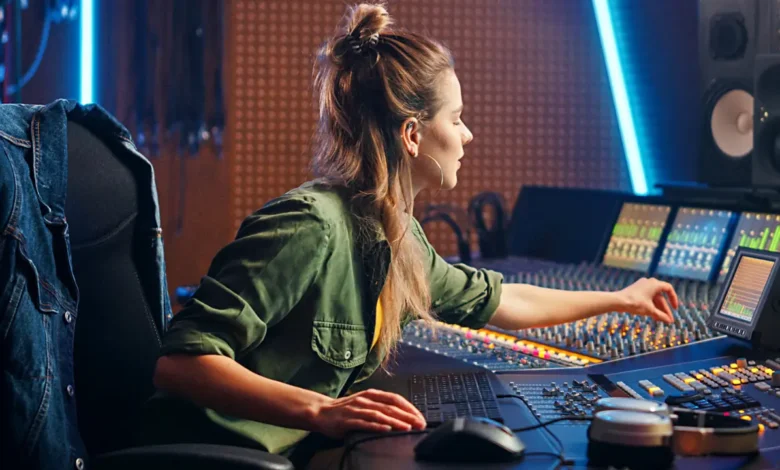In a world where creativity knows no bounds, the art of remixing has taken center stage. Whether you’re grooving to your favorite DJ’s latest drop or scrolling through social media reels featuring catchy remixes, you can’t escape the impact of this digital phenomenon. Enter RemixPapa—a platform that embodies the spirit of innovation by celebrating and enabling digital remixes in their many forms.
What exactly is a remix? How did we arrive at this exciting era of musical reinterpretation? Join us on an exploration as we dive deep into the evolution and magic behind digital remixes. Along the way, we’ll uncover platforms fueling this creative explosion, spotlight artists who are redefining music with their unique spins, and tackle some important questions surrounding copyright laws. Ready to get inspired? Let’s embark on this rhythmic journey together!
What is a Remix?
A remix is more than just a rehash of an existing song. It’s an art form that breathes new life into music. By taking original tracks and altering elements like tempo, instrumentation, or vocals, artists create something fresh and exciting.
This creative process can involve layering additional beats, incorporating samples from other songs, or even shifting genres entirely. The result? A unique piece that captivates listeners in ways the original might not have.
Remixes span various styles—from electronic dance music to hip-hop mashups—showcasing the versatility of sound. They invite collaboration across different genres and communities while allowing both established artists and newcomers to shine.
In essence, a remix is a celebration of creativity where every version tells its own story through sound.
Evolution of Remixes in the Digital Age
The evolution of remixes has taken an interesting turn in the digital age. Once, remixing was a labor-intensive process. Artists had to rely on physical media and intricate studio setups.
Today, technology has democratized this craft. Digital audio workstations (DAWs) enable anyone with a computer to create music. The barriers have lowered significantly.
Social media also plays a crucial role in this transformation. Platforms like SoundCloud and YouTube allow creators to share their remixes instantly. They can reach audiences across the globe within moments.
Additionally, accessibility has led to new styles emerging all the time. Genres blend seamlessly as artists experiment with diverse sounds and influences.
As more tools become available, creativity flourishes further than ever before. Musicians are pushing boundaries and reshaping how we perceive original tracks versus remixed versions.
The Rise of Digital Remixing Platforms
In recent years, digital remixing platforms have surged in popularity. These online spaces allow creators to play with existing music and craft something fresh. The accessibility of these tools has transformed the creative landscape.
Platforms like SoundCloud, BandLab, and RemixPapa enable users to share their work easily. Artists can collaborate across continents without ever meeting face-to-face. This connectivity fosters a vibrant community of musicians eager to experiment.
The rise of social media has also fueled this growth. Creators can showcase their remixes on platforms like TikTok and Instagram, gaining instant feedback from audiences worldwide. This immediacy encourages innovation while building fan bases.
As technology advances, new features emerge that enhance remixing capabilities further. From AI-assisted tools to intuitive editing software, the future looks promising for aspiring DJs and producers looking to make an impact in the industry.
Popular Artists and DJs using Digital Remixes
The world of digital remixes is buzzing with talent. Many popular artists and DJs have embraced this art form, pushing boundaries and challenging the norm.
Take Diplo, for example. He effortlessly blends genres to create infectious tracks that resonate with diverse audiences. His remixes often breathe new life into songs, making them dancefloor favorites.
Then there’s Zedd, known for his electrifying beats and catchy hooks. His remix of “Clarity” catapulted him into stardom, showcasing how a fresh take can redefine a track’s impact.
Another notable mention is Kygo. With his tropical house vibe, he adds warmth to any song he touches. Remixes like “Stole the Show” highlight his ability to transform melodies into summer anthems.
These artists represent just a fraction of those who harness the power of digital remixing. Their creativity keeps fans engaged while influencing emerging talents in the industry.
Advantages and Disadvantages of Digital Remixing
Digital remixing has revolutionized how we experience music. One major advantage is accessibility. Aspiring artists can create and share their work easily, breaking down barriers that once limited creativity.
Additionally, remixes breathe new life into existing tracks. They offer fresh perspectives on familiar songs, attracting diverse audiences and fostering musical exploration.
However, digital remixing isn’t without downsides. The ease of access can lead to an oversaturated market, making it challenging for unique voices to stand out.
Moreover, the blurred lines between original work and remixes often spark debates about authenticity in art. This can confuse listeners who may struggle to discern a song’s true origin.
Navigating copyright laws poses risks for creators. Artists must tread carefully to avoid legal troubles while trying to innovate within this vibrant space.
Copyright Issues Surrounding Digital Remixes
Copyright issues are a complex landscape for digital remixers. When artists manipulate existing songs, they often tread on legal ground that can be tricky to navigate.
The original creators hold the rights to their work. This means that unauthorized remixes could lead to legal disputes or take-down notices. Even a simple sample can result in hefty fines if not cleared properly.
Platforms like RemixPapa encourage creativity but also caution users about the importance of copyright laws. Many famous tracks have faced challenges due to unlicensed remixes, illustrating the risks involved.
Understanding fair use is essential as it provides some leeway for transformative works. However, this gray area leaves many remixers uncertain about what constitutes originality versus infringement.
Digital technology continues to evolve, making it critical for artists and fans alike to stay informed about these ever-changing regulations surrounding digital remixes.
How to Create Your Own Digital Remixes
Creating your own digital remixes can be an exciting venture. Start by selecting a song that resonates with you. Choose something that sparks inspiration.
Next, get familiar with digital audio workstations (DAWs). Programs like Ableton Live or FL Studio offer powerful tools for remixing tracks. They allow you to manipulate sound easily.
Once you’ve set up your DAW, import the original track. Isolate elements such as vocals, beats, or instrumentals to play around with them individually.
Experimentation is key in this phase. Try adding new beats or changing tempos to create a fresh vibe. Incorporating samples from other songs can also enhance your remix’s uniqueness.
Don’t forget about effects! Adding reverb or delay can give depth and texture to your sounds. Trust your instincts—if it feels right, go with it!
Last but not least, share your creation on platforms like RemixPapa and gauge feedback from fellow enthusiasts!
Final Thoughts on the Future of Digital Remixing
The future of digital remixing is vibrant and full of possibilities. As technology continues to advance, more tools will become available for creators everywhere. This democratization encourages fresh talent to experiment with sound.
Artificial intelligence plays an intriguing role. AI-driven software can analyze tracks and suggest innovative combinations that might not have been considered by human ears alone.
Moreover, the rise of virtual reality could immerse listeners in entirely new audio experiences. Imagine a world where remixes are not just heard but felt through interactive environments.
Collaborative platforms may also flourish, creating communities dedicated to remix culture. Artists can share resources, learn from each other, and push creative boundaries together.
As we embrace these changes, it’s essential to maintain respect for original content while celebrating innovation in music production. The journey ahead promises excitement as artists redefine what it means to create and share music in a digital landscape.
Conclusion
Digital remixing has transformed the music landscape in remarkable ways. From its early days of simple edits to the complex soundscapes created today, remixes have become an integral part of musical expression and creativity. Platforms like RemixPapa showcase this evolution, allowing both seasoned artists and budding creators to share their unique takes.
As we navigate through copyright issues and embrace new technologies, the future of digital remixing appears bright. The blend of artistry and technology will continue to inspire innovation across genres. Whether you are a listener or a creator, there’s no denying that the world of remixes holds endless possibilities for exploration and enjoyment. Embrace it—there’s always something fresh waiting around the corner!






